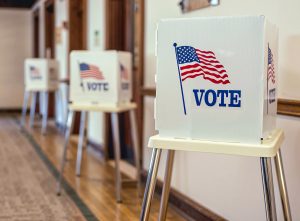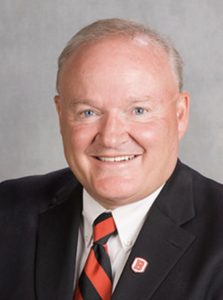Bradley leader: Pocketbook issues turned election
By Tim Alexander For Chronicle Media — January 25, 2025
PEORIA — Poll data shows that 90 million eligible voters declined to participate in the 2024 presidential election that pitted Vice President Kamala Harris, a liberal, West Coast Democrat, and former President Donald Trump, a convicted felon and past reality television star running as a Republican.
Overall, only 64 percent of voting-age Americans went to the polls for the Nov. 5 election won by Trump, compared to a 66 percent turnout for the 2020 election that saw Joe Biden defeat Trump, who was then the 45th president.
According to the executive director of the Institute for Principled Leadership in Public Service at Bradley University, the U.S. is 31st in age-eligible voter turnout among all democratic nations in the world. Brad McMillan, who led a three-part online educational series for BU’s Osher Lifelong Learning Institute titled “Dissecting the 2024 Presidential and Congressional Election Results” during January, says there are several reasons many Americans chose to stay home on Election Day.
“America does rank second in the turnout of registered voters, with 94.1 percent showing up for this presidential election. The problem is we have 90 million eligible Americans that didn’t vote. These are Americans who are not participating in our elections and our democracy,” said McMillian, who for 10 years served as district chief of staff for former U.S. Rep. Ray LaHood, a Peoria Republican known for his ability to work with legislators on both sides of the political aisle.
Those who did vote in the election seemed to be laser focused on the economy and national security, according to McMillan’s observations, placing secondary importance on Democratic platform issues such as women’s reproductive rights and climate policy.

Bradley University’s Osher Lifelong Learning Institute conducted an online education series titled “Dissecting the 2024 Presidential and Congressional Election Results.” (Bradley University photo)
“Economic worries probably mattered most. The price people are paying for groceries has inflated at a significant rate under the Biden administration. Something that went along with that was the price of housing, whether it was how much your rent went up or your inability to get a mortgage for a home. So, the pocketbook issues at the end of the day were the things that I think helped get Trump elected,” McMillan said, crediting Trump for his ability to attract new voters in the 2024 election compared to his opponent.
“More Latinos voted for Trump than any other presidential candidate in history. Trump aggressively went after the Latino vote and it helped him significantly. The other thing Trump did was double his percentage of black male voters. In the key swing states like Michigan and Pennsylvania, that made a difference,” McMillan observed.
Biden-Harris policy on the Russia-Ukraine invasion and wars in the Middle East — most notably the Gaza Strip conflict between Palestine and Israel — also did not resonate with certain U.S. voting blocs, according to the Bradley professor and political pundit.

Brad McMillan
“There is a very significant Muslim population in Dearborn, Michigan, which usually votes very Democratic, but voted 45 percent for Trump in this election, so if you look at the margins in the swing states Trump being able to attract new voters in these categories made a significant difference,” McMillan said. “I think Trump successfully put together an anti-establishment coalition. What I mean by that are people who are dissatisfied with what they see as politics as usual, and they saw Trump as the outside candidate. The bottom line is that we are still a deeply divided country when you look at how close the margins were in the seven swing states.
“The Republican base is now made up largely of the working class, so not only in the rural areas of America but I think Trump also got a significant portion of the labor vote. Even the metropolitan areas that are working class ended up voting for Trump.”
McMillan expressed amazement at how quickly Harris was able to amass a war chest of contributions after Biden exited the race on July 21, 2024, following his “debate debacle” against Trump viewed by millions on national television. Harris’ composure during her subsequent debate against Trump earned her some votes, McMillan noted, though not enough to offset Republican voters who were not put off by Trump’s bizarre “Haitians eating pets” declaration and other inaccurate statements he put forth during that debate.
“I personally think both candidates worked very hard in this election; they both were everywhere in the swing states. I think Harris ran a competitive race with one glaring error — when she was interviewed on ‘The View’ she was asked if she would do anything different than what Biden did, and she responded that she couldn’t think of anything she would do differently. In the swing states that response was the (context of the) main commercial Trump ran, and with Biden so unpopular you would’ve thought she would’ve had a better answer to that question,” McMillan opined. “Trump won a decisive election because it was consistent in the swing states. That is how he won so many electoral votes.”
Though McMillan worked with LaHood and has identified as a Republican, the BU professor told the approximately 60 OLLI members who tuned in for the webinar that he is now more of a centrist. He encourages his students to become involved in the political process and stay involved, no matter their political leanings, and to always support the president and other elected officials.
“I’m thankful that we’re having a peaceful transition of power. I think it’s good that Trump won both the popular and the electoral vote so there is certainty. I think most Americans felt that the elections were run safely and securely, and I’m of the personal belief that whoever we elect president we should wish well and want the country to do well,” said McMillan.
Former Congressman Ray LaHood will join McMillan closed out the study series on Wednesday, with a discussion on how Americans can engage in a civil discourse moving forward to lessen the deep political division in our country.
For more information on Bradley University’s Osher Lifelong Learning Institute, which is offered by BU’s Division of Continuing Education and geared toward ages 50-plus, call (309) 677-3900, email olli@bradley.edu or visit bradley.edu/olli. OLLI spring registration begins on Feb. 6.







